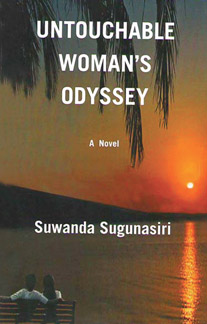Real and imaginary homelands
 Salman
Rushdie, in his essay ‘Imaginary Homelands’, written in 1982, has this
to say. “It may be that writers in my position, exiles or emigrants or
expatriates, are haunted by some sense of loss, some urge to reclaim, to
look back........but if we do look back, we must also do so in the
knowledge ...that our physical alienation from India almost inevitably
means that we will not be capable of reclaiming precisely the thing that
was lost...” Salman
Rushdie, in his essay ‘Imaginary Homelands’, written in 1982, has this
to say. “It may be that writers in my position, exiles or emigrants or
expatriates, are haunted by some sense of loss, some urge to reclaim, to
look back........but if we do look back, we must also do so in the
knowledge ...that our physical alienation from India almost inevitably
means that we will not be capable of reclaiming precisely the thing that
was lost...”
This is probably what happens to most diaspora, writers, even from
Sri Lanka. So I thought, as I picked up ‘The Untouchable Woman’s
Odyssey’ by Suwanda Sugunasiri, who has been living in Canada since
1973.
Su Ha Ja Sugunasiri, that is how he was known during his young days
in Sri Lanka, through his Sinhala Short Fiction, translations and
critical studies, and also as ‘Madhupa’ through his column in a Sinhala
newspaper. He had left our shores nearly five decades ago on a Fulbright
Scholarship to the University of Pennsylvania. In the West, in Canada,
he is known as Prof. Suwanda Sugunasiri among the academics and the
Buddhist community. He is the founder of the Nalanda College of Buddhist
Studies, Faculty of Divinity, Trinity College at the University of
Toronto. He has written a weekly column for the Toronto Star since early
1990s. Sugunasiri has published four volumes of English poetry. This is
his first novel.
 Sugunasiri
had never severed the umbilical cord with his motherland. His memories
were always alive, through his work among the Canadian Buddhists. He is
the Founding Editor of the Canadian Journal of Bhuddhist Studies, and
authored ‘Rebirth as Empirical Basis for the Buddha’s Four Noble
Truths’. Among his literary works we find, ‘Faces of Galle Face Green’
and ‘Sri Lankan Literature (Sinhala, Tamil, English) with Prof. A.V.
Suraweera. Sugunasiri
had never severed the umbilical cord with his motherland. His memories
were always alive, through his work among the Canadian Buddhists. He is
the Founding Editor of the Canadian Journal of Bhuddhist Studies, and
authored ‘Rebirth as Empirical Basis for the Buddha’s Four Noble
Truths’. Among his literary works we find, ‘Faces of Galle Face Green’
and ‘Sri Lankan Literature (Sinhala, Tamil, English) with Prof. A.V.
Suraweera.
In ‘The Untouchable Woman’s Odyssey’, we find a home-sick writer,
haunted by some sense of loss and wanting to look back, without much
difficulty. Though he says it is ‘in a mythical setting, within the
wider geographic context of South Asia, in which the mythic comes to be
in dalliance with the historic(al), the experiential and the spiritual’,
it is not very difficult for the reader in Sri Lanka to identify such
places and people. Yet to a reader outside Sri Lanka, who is not
familiar with these names, it could be a setting anywhere in South Asia,
which Sugunasiri has achieved through his style of writing.
As he says in his introductory pages, quoting from the Dhammapada,
many among humans, unable to reach the shore beyond, run along the
(hither) bank. This run is not at an even pace over a smooth path, but
over rugged terrain, creeping through thorny bushes, climbing over
obstacles, some falling down by the wayside, others manage to crawl
along, while still others prefers to sit down and watch those who run
past them. It is about these human beings, among them the untouchable
woman Thangamma, that the story is woven about.
Sugunasairi tells us about the race, caste and class issues as seen
in a South Asian village in the mid 20th century, and move into the
urban society, of the early twenty first century. The story is about
young men and women who try to uplift the lot of these people, with
genuine concern and how politically motivated, power hungry people
exploit such situations.
He has used his knowledge of Buddhism, about the concept of rebirth
and karma as we see it in our part of the world, and woven a tapestry
which would please a wider readership. Milton, the school headmaster’s
son of a ‘respectable caste’ marrying the latrine-cleaners daughter,
Thangamma, from an ‘untouchable caste’ of a different ethnic community.
Milton who becomes Milinda as he gets involved in a nationalist
movement. But the Untouchable Woman, Thangamma is the heroine, the true
woman of Asia with a practical mind, adaptable to any situation, to face
any hardship, deprivation and also with the strength and the willpower.
The author also has used his poetic license when describing certain
places and incidents, perhaps with his intention of reaching out to the
readers outside Sri Lanka, and as an author exposed to the culture of
the East and West, he has used the license well. Unless he was covering
up his failure to ‘reclaim precisely the thing that was lost’.
How successful Sugunasiri’s attempt to disguise places and names in
the story, in order to make it an ‘Imaginary Homeland’ could be judged
only by readers outside the ‘homeland’. We try to relate the names and
places familiar to us in our homeland.
His first attempt at a novel, which had been twenty years in the
making, is an indication of what he could produce as a writer of fiction
in the future, now that he has retired from his academic duties.
[email protected]
|



